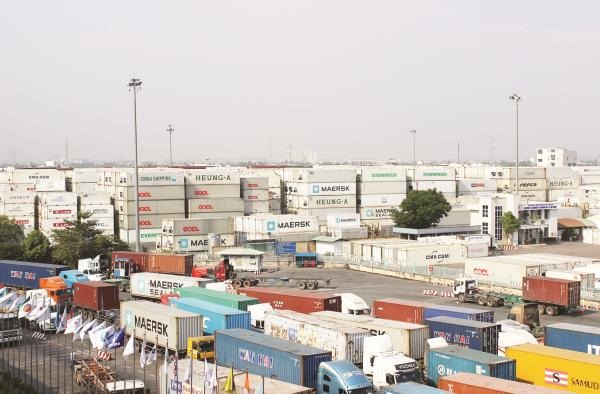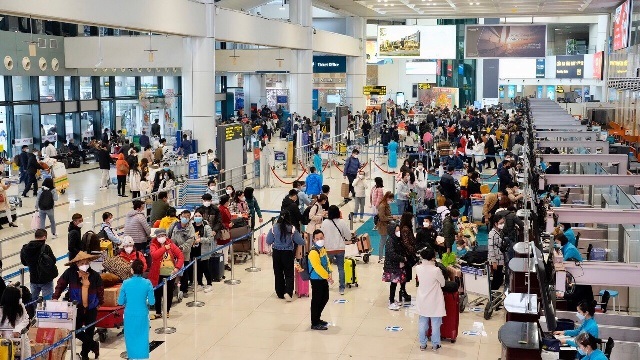.jpg) Society
Society

Thousands of containers were left at Cát Lái Port, HCM City over the last few months because owners haven’t visited the customs department to complete the necessary procedures, Thanh Niên (Young People) newspaper reported.
 |
| HCM City’s Cát Lái Port is at risk of overload due to the high amount of containers being stored for months at a time.-- Photo thanhnien.vn |
HÀ NỘI – Thousands of containers were left at Cát Lái Port, HCM City over the last few months because owners haven’t visited the customs department to complete the necessary procedures, Thanh Niên (Young People) newspaper reported.
This situation is causing both port companies and customs agencies a headache.
Ngô Minh Thuận, deputy general director of Sài Gòn Tân Cảng (New Port) Corporation, told the newspaper that Cát Lái Port is in peak phase after the recent holiday season.
At present, the amount of goods being left at Cát Lái Port is around 91.3 per cent of capacity, of that the imported goods up to nearly 120 per cent.
Due to the high amount of stored goods at the port, many imported containers are being left in a queue at Cái Mép and Tân Cảng – Hiệp Phước ports, before being moved to the final destination at Cát Lái Port.
In particular, at Cát Lái Port, the amount of long-day stored goods was very large, about 8,050 TEUs (1 teus equals one 20-foot container), including: 5,234 TEUs of plastic goods and waste-paper, and another 2,816 TEUs of goods that were stored for 90 days or longer.
The amount of goods is likely to remain at the port for the foreseeable future, according to Ngô Minh Thuận.
Thuận said the increase of long-day stored containers has seriously affected operations at Cát Lái Port and the progress of cargo container delivery.
At a conference between the customs department and related enterprises on May 8, Ngô Minh Thuận proposed solutions to the HCM City’s Customs Department to solve a number of urgent issues related to handling of stored goods, including more than 5,200 scrap containers.
The Sài Gòn New Port Corporation has asked that the city’s Customs Department allow them to transport goods stored for a long time. Firstly, it will move 90-day stored goods; as well as plastics and scrap paper stored longer than 90 days at Cát Lái Port to Tân Cảng Hiệp Phước Port, Nhơn Trạch Inland Container Depot (ICD), Long Bình ICD, and others.
When the cargo owners need to carry out procedures for receiving goods, Sài Gòn New Port Corporation will transport the containers back to Cát Lái Port.
The corporation asked to be allowed to seek land areas adjacent to the port area for storing long-day containers under the supervision of the customs sub-department of Sài Gòn Port.
Sài Gòn New Port Corporation will bear the costs of renting and securing necessary conditions under customs department’s management and supervision.
The situation remains complicated and if there are no strict management measures from the ministries, and State management agencies, the volume of such containers will continue to increase in Việt Nam’s seaports, including Cát Lái Port, an important gate for export goods.
According to the Sài Gòn New Port Corporation, since January 1, this year, due to the impact of China’s ban on imports of scraps, the volume of plastic and paper scraps imported through Việt Nam seaports has increased dramatically.
The Ministry of Natural Resources and Environment and the Ministry of Industry and Trade have tightened the licensing of imports of these items into the Vietnamese territory, leading to many shipments arriving in Việt Nam not being able to complete procedures.
At present, the amount of plastic and paper scrap containers stored at Cát Lái Port number up to 1,000 TEUs. The port is facing issues with the increase of stored goods.
Recently, Sài Gòn New Port Corporation has mapped out a measure to handle the situation.
It’s asking the shipping companies to require importers to provide a valid permit for shipments of scraps, and to commit to a specific time of loading.
For scrap containers stored in the Cái Mép area bound for Cát Lái, the port will carry goods over only when owners provide full import documents and commit to a deadline for receive goods.
For goods left in stock more than 30 days at Cát Lái, the port’s management board will transport the goods to Hiệp Phước New Port for storage. In that case, all expenses related to transportation will be paid by the owners of the goods.-- VNS



.jpg)





.jpg)